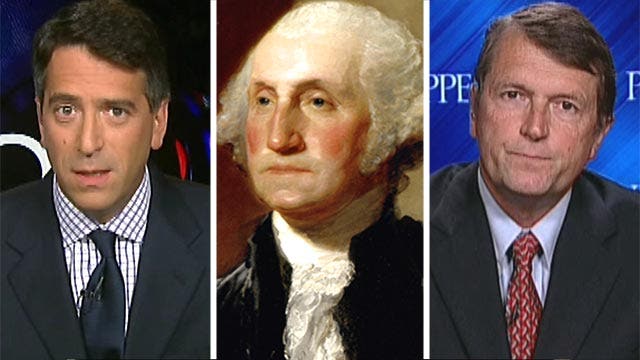The Foxhole: George Washington and value of self-interest
The Foxhole: On the 215th anniversary of George Washington's death, James Rosen talks with author Edward J. Larson about his new book 'The Return of George Washington: 1783-1789'
December 14 will mark the 215th anniversary of George Washington’s death, and while the founder of our country remains a singular figure in American history and life – his name and visage are still synonymous with the United States, and encountered on a daily basis by just about every sentient citizen – even Washington, in death, finds himself subjected to the ebbs and flows of fashion.
Case in point: the new AP History course framework. All high school achievers are familiar with AP classes, which represent, for most of them, the only courses they can take to obtain college credits. As Fox News reported in August, the latest edition of the AP History framework contains only two mentions of George Washington.
The first is a fleeting reference to his Farewell Address, in which he warned of foreign entanglements – perhaps a subtle injunction by AP against military ventures like the Iraq War. The second is a suggestion that “a good essay…might note…that the outcome of the American Revolution saw no broad change in the composition of those who dominated the social, political, and economic structure of the former colonies. Those individuals who were wealthy, powerful, and influential before the event continued to possess wealth, power, and influence later. George Washington, John Adams, and Thomas Jefferson could serve as examples.”
With his new book The Return of George Washington: 1783-1789 (William Morrow, October 2014), Pulitzer Prize-winning historian Edward J. Larson offers a fresh and elegantly written reminder of why it is important – indeed, critical – that we remember Washington for reasons that extend far beyond his relative wealth and social status in his own time.
While the Library of Congress records entries for literally thousands of books about our first president, Larson said in a recent visit to “The Foxhole” that not many of these studies were focused on Washington’s self-imposed retirement: the interregnum that stretched form his stunning resignation of his commission as commander-in-chief of the Continental Army, following the colonies’ victory in the Revolutionary War, to his decision to stand for the presidency.
This period was intended to allow Washington to focus on his estate at Mount Vernon, yet he grew increasingly active as the Articles of Confederation unraveled, and demonstrated his continued indispensability in a number of important episodes, not least the work of the Constitutional Convention.
“His resigning after the war was one of his most notable features, one of the things that made him a hero,” said Larson, a history professor at Pepperdine University who bristles at depictions of Washington, such as AP’s, that reduce him to a self-interested “elite” who used his prominence to preserve his own wealth and power.
“That strain of thinking goes back to [historian] Charles Beard and his book [An Economic Interpretation of the Constitution of the United States]…Historians have looked over that, over the period [since Beard published in 1913], and it is too critical….Certainly [the Founders] would benefit, but all Americans would benefit from having an effective national economy. And one thing that was central: Washington had three main goals with the Constitution and then with this new government. His platform was: respect abroad, prosperity at home, and expansion westward.
“Now he would often write that this expansion westward would benefit him, of course; but it would benefit all people, all Americans, because it was that outlet of the frontier, that opportunity, that made America special, where in England and Europe, people were trapped in their villages. They really didn’t have a choice.
“[Washington] often observed that of course people are motivated by their own self-interest. But if that self-interest coincides with the national self-interest, that’s how we can get a government that’s effective, and works. He was a pragmatic politician; he was a pragmatic military leader who had taken a rebel army, just a rabble, and turned it into an army that was able, in a war of attrition, to defeat the strongest army in the world. Now he couldn’t have done that unless the soldiers believed that they personally would benefit from this cause.
“That’s how he viewed his presidency, that’s how he viewed this in-between period [from 1783 to 1789]: to show people how they would be better off – and their country would be better off, and their children would be better off – by an effective union, rather than squabbling, petty states.”
Asked to define in a single word the essence of Washington’s leadership, what made him so influential among the men and institutions of his own time – and beyond – Larson answered: “Character.”









































